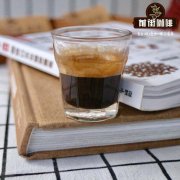Introduction to Jamaica Coffee Manor: coffee characteristics of Cliff Manor, Jamaica

Professional coffee knowledge exchange More coffee bean information Please pay attention to coffee workshop (Weixin Official Accounts cafe_style)
Jamaica Cliff Manor Coffee Features Cliff Manor Coffee Types Introduction
The harvest period of Jamaica Blue Mountain Coffee is from June to November every year. It is generally picked by hand. After picking, it goes through washing, peeling, fermentation, dehydration, drying, shelling and baking in order to get a ripe Blue Mountain Coffee bean. In the green bean processing process, each step has a special person responsible for quality supervision. For the very precious Blue Mountain coffee, the packaging and transportation methods adopted by the Jamaica government are also different.
Flavor: Very intense aromas with persistent fruity notes;
Blue Mountain coffee is not packed and transported in bags like other coffees, but in barrels of 70kg/barrel, 18kg/barrel, 15kg/barrel. Jamaica was also the last country to still ship coffee in traditional barrels. Jamaica Blue Mountain Coffee beans must obtain a Certificate of Quality from the Jamaica Coffee Industry Council, which is the only body in Jamaica authorized to issue such certificates. And each batch of exports will have a special quality supervision expert responsible for sampling, roasting, grinding and brewing into coffee, and finally make a standard judgment on why Blue Mountain coffee tastes pure "secret": their coffee trees all grow on rugged hillsides, the picking process is very difficult, non-local skilled female workers simply can not be competent. It's important to pick coffee beans that are ripe, as immature or overripe can affect the quality of coffee. The beans are shelled the same day and allowed to ferment for 12-18 hours. Coffee beans are then washed and sifted. After that, the process is drying, which must be carried out on concrete floor or thick blanket until the humidity of coffee beans drops to 12%-14%. Then they are stored in special silos. When needed, it is taken out and roasted, and then ground into powder. These procedures must be strictly controlled, otherwise, the quality of coffee will be affected.
In 1717 King Louis XV of France ordered coffee to be grown in Jamaica, and in the mid-1920s Nicholas, governor of Jamaica. Nicholas Lawes imported Arabica seeds from Martinique and began planting them in St. Andrew. To this day, St. Andrew's is one of the top three growing regions for Blue Mountain coffee in Jamaica, along with Portland and St. Thomas. Within eight years, Jamaica exported more than 375 tons of pure coffee. Coffee production peaked in 1932, harvesting more than 15000 tons of coffee. The Jamaica Coffee Industry Board was established by the Government of Jamaica in 1950 to establish quality standards for Jamaica coffee and oversee the implementation of quality standards to ensure the quality of Jamaica coffee. The Commission awards a special official seal to Jamaica's exports of green and roasted coffee and is the world's highest national coffee authority. At present, Mavis Bank Coffee Factory (M.B.C. F), Blue Mountain Coffee Cooperative Factory (M.H.C.C.T.), Portland Blue Mountain Coffee Cooperative Plant (P.X.X.S.H.), Coffee Industry Association (Wallenford), Coffee Industry Association (St. John's Peak) and Blue (J.A.S.)
Jamaica Jamaica
Population: 2711000
Jamaica has only one coffee-growing area and is the most famous in the world.
BLUE MOUNTAIN
Blue Mountain Coffee, the most successful production in coffee history, Jamaica This particular region has been well defined and well protected. Only in Saint Andrew, Saint Thomas, Portland and Saint Mary can coffee grown at altitudes between 900 and 1500 metres (3000 and 4900 feet) be called "Jamaica Blue Mountain." Coffee grown between 450 and 900 meters (15,003, 000ft) above sea level is known as Jamaica High Mountain, while coffee beans grown below these areas are known as Jamaica Supreme or Jamaica Low Mountain. The traceability of Blue Mountain coffee can cause some confusion, as most coffees are sold according to the name of the plant where they were processed. These factories may occasionally buy coffee from a single large estate, but usually they buy it from the countless small farmers in the area. Jamaica's Blue Mountain coffee has long been exported to Japan in small barrels rather than sacks. It is also worth mentioning that because Blue Mountain coffee can soar in price, there are usually a large number of imitations on the market.
Altitude: 900- 1,500 m
Harvest: June-July
Varieties: Jamaica Blue Mountain (a Type derivative), Type
Granules: plump;
Recommended baking method: medium baking;
Blue Mountain coffee is low in caffeine, less than half of other coffees, in line with modern health concepts. The same coffee tree species, whether grown in Hawaii, Kenya, Papua New Guinea or anywhere else with similar climates, did not produce the flavor of Blue Mountain coffee beans.
Pure Jamaica Blue Mountain Coffee combines the unique sour, bitter, sweet and alcoholic flavors of coffee perfectly to form a strong and attractive elegant flavor that is unmatched by other coffees.
Blue Mountain coffee lovers say: "It's a coffee beauty with all the advantages of good coffee in one."
"It's aromatic, smooth, mellow, and it feels precious to me like a gem," said Jim, general manager of Pitt's, a coffee and tea company known in the United States. It is precisely because the taste of Blue Mountain Coffee is moderate and perfect, so Blue Mountain Coffee is generally drunk in the form of black coffee.
"Its liquid is golden yellow under the sun and tastes very smooth. Coffee books say that Blue Mountain is the only coffee in the world that has both bitterness and sourness and can be enjoyed. After drinking it, you will understand."
Blue Mountain Coffee's Secret
Why Blue Mountain Coffee tastes pure "secret": their coffee trees all grow on rugged hillsides, picking process is very difficult, non-local skilled women simply can not be competent. It's important to pick coffee beans that are ripe, as immature or overripe can affect the quality of coffee. The beans are shelled the same day and allowed to ferment for 12-18 hours. Coffee beans are then washed and sifted. After that, the process is drying, which must be carried out on concrete floor or thick blanket until the humidity of coffee beans drops to 12%-14%. Then they are stored in special silos. When needed, it is taken out and roasted, and then ground into powder. These procedures must be strictly controlled, otherwise, the quality of coffee will be affected.
The best Blue Mountain coffee is undoubtedly one of the best coffee available. While price can guarantee an adequate supply of Blue Mountain coffee, it does not guarantee the coffee has the best flavor. Also, this coffee tastes a lot more expensive than it looks. To taste its best flavor, put in more coffee beans than other coffee, otherwise the flavor will be a little different, so the flavor lies in it than the price of coffee added 10% to 15% more coffee beans.
There are three varieties of coffee in Jamaica: Jamaica Blue Mountain Coffee, Jamaica High Mountain Supreme Coffee Beans and Jamaica Prime Coffee Beans. Among them, Blue Mountain Coffee and Alpine Coffee are divided into four grades. From the top to the bottom of the quality points are: NO.1, NO.2, NO.3 and PB, PB is round beans. According to CIB standards, only coffee grown above 666 meters above sea level is called Jamaica Blue Mountain Coffee; coffee grown below 666 meters in the Blue Mountains of Jamaica is called Alpine Coffee; coffee grown outside the Blue Mountains is called Jamaica Coffee. It turns out that Chinese coffee industry generally has a wrong understanding that only coffee planted in the Blue Mountain area above 1800 meters above sea level can be called Blue Mountain Coffee. In fact, there is only one manor, Amber, on the mountain crown above 1800 meters above sea level. It is descended from Chinese people. The manor's main surname is Lyn (Lin). Its ancestral home is Guangdong, China. The manor has only 30 hectares of land and its yield is very small. Blue Mountain Coffee is mainly distributed in John Crow, St. John's Peak,Mossman's Peak,High Peak,Blue Mountian Peak and other five mountain areas in the Blue Mountains.
Related recommendations: authentic Jamaica blue mountain coffee price why so expensive? First, make sure it's authentic.
Important Notice :
前街咖啡 FrontStreet Coffee has moved to new addredd:
FrontStreet Coffee Address: 315,Donghua East Road,GuangZhou
Tel:020 38364473
- Prev

Jamaica Coffee Manor introduction: coffee beans in Atlanta, Jamaica
Professional Coffee knowledge Exchange more information on coffee beans Please follow Coffee Workshop (Wechat official account cafe_style) Jamaica Blue Mountain New Coffee beans the real Blue Mountain Coffee is one of the most advantageous growing conditions in the world, Jamaica's weather, geological structure and terrain together provide an ideal place. The ridge across Jamaica extends to the eastern part of the island, the Blue Mountains.
- Next

Jamaica Coffee Manor introduction: what is the flavor of coffee beans in Silver Mountain Manor, Jamaica?
Professional coffee knowledge exchange more coffee bean information Please pay attention to the coffee workshop (Wechat official account cafe_style) Jamaica Blue Mountain Coffee is harvested from June to November. Usually it is picked by hand. After picking, it goes through washing, peeling, fermentation, dehydration, drying, shelling, baking and other processes to get a blue mountain coffee ripe beans. In the process of raw bean processing
Related
- Does Rose Summer choose Blue, Green or Red? Detailed explanation of Rose Summer Coffee plots and Classification in Panamanian Jade Manor
- What is the difference between the origin, producing area, processing plant, cooperative and manor of coffee beans?
- How fine does the espresso powder fit? how to grind the espresso?
- Sca coffee roasting degree color card coffee roasting degree 8 roasting color values what do you mean?
- The practice of lattes: how to make lattes at home
- Introduction to Indonesian Fine Coffee beans-- Java Coffee producing area of Indonesian Arabica Coffee
- How much will the flavor of light and medium roasted rose summer be expressed? What baking level is rose summer suitable for?
- Introduction to the characteristics of washing, sun-drying or wet-planing coffee commonly used in Mantenin, Indonesia
- Price characteristics of Arabica Coffee Bean Starbucks introduction to Manning Coffee Bean Taste producing area Variety Manor
- What is the authentic Yega flavor? What are the flavor characteristics of the really excellent Yejasuffi coffee beans?

